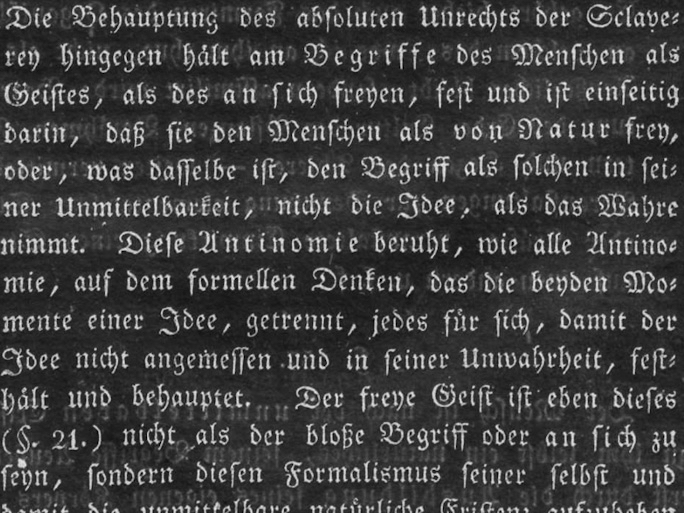We are glad to give notice of the workshop “Hegel, Slavery and Abolition”, which will take place on August 30th, 2022 at the Humboldt Univerity (main building, room 2070A) and on line. The workshop belongs to the Hegel (anti)kolonial event series.This workshop is organized by Daniel James and Franz Knappik, with the support of Tobias Rosefeldt (HU Berlin). It is funded by Thyssen Stiftung.
…
The 5th edition of Hegel (anti)kolonial addresses Hegel’s philosophical stance on slavery, especially in the context of colonialism. While Hegel’s famous dialectic of lordship and bondage in the Phenomenology of Spirit has often been read as emancipatory critique of oppressive relations such as slavery, and his theory of freedom praises the notion that all human beings are entitled to freedom as an insight that is pivotal to modernity, there are various places in Hegel’s oeuvre where he takes a deeply ambivalent position when it comes to slavery. Thus, in lectures from his Berlin period, he revisits the dialectic of lordship and bondage in order to present colonial slavery as a necessary precondition for liberation that serves to educate and discipline enslaved people, and he claims that transatlantic chattle slavery marks a progress vis-à-vis the cruelties that characterize, in his account, traditional forms of life in Africa. And in a long remark following section 57 in his Elements of the Philosophy of Right, Hegel constructs the contemporary debate on slavery as an “antinomy” in which both sides grasp a partial truth: those who reject slavery are right insofar as slavery is ultimately unjust; yet at the same time, those who defend slavery are right insofar as humans are initially “natural beings” that have to go through a process of education in order to become free—a process in which slavery has a legitimate place. This ambivalent assessment of slavery is matched by remarks that Hegel makes in his Lectures on the Philosophy of History about abolition, one of the biggest moral and political issues in his lifetime: Hegel favours gradual abolition, rejecting demands for an immediate abolition of slavery on the grounds that enslaved people have to be sufficiently educated before they are capable of a life in freedom.
How can we exactly understand Hegel’s pronouncements on slavery, and what are their underlying philosophical motivations? How do they connect to other parts of his system, such as his views on property and personality, and his theories of race and of history? How can we understand Hegel’s place in 19th century debates on slavery and abolition, and how do these issues relate to more recent philosophical engagements with Hegel? These are some of the questions that we are going to discuss at our workshop.
Venue / Zoom
Humboldt University Berlin, main building, Unter den Linden 6, room 2070A. Streamed via Zoom; online participants are welcome to take part in the discussion. To register, click here.
Please find here the program of the event.
Printable Version

